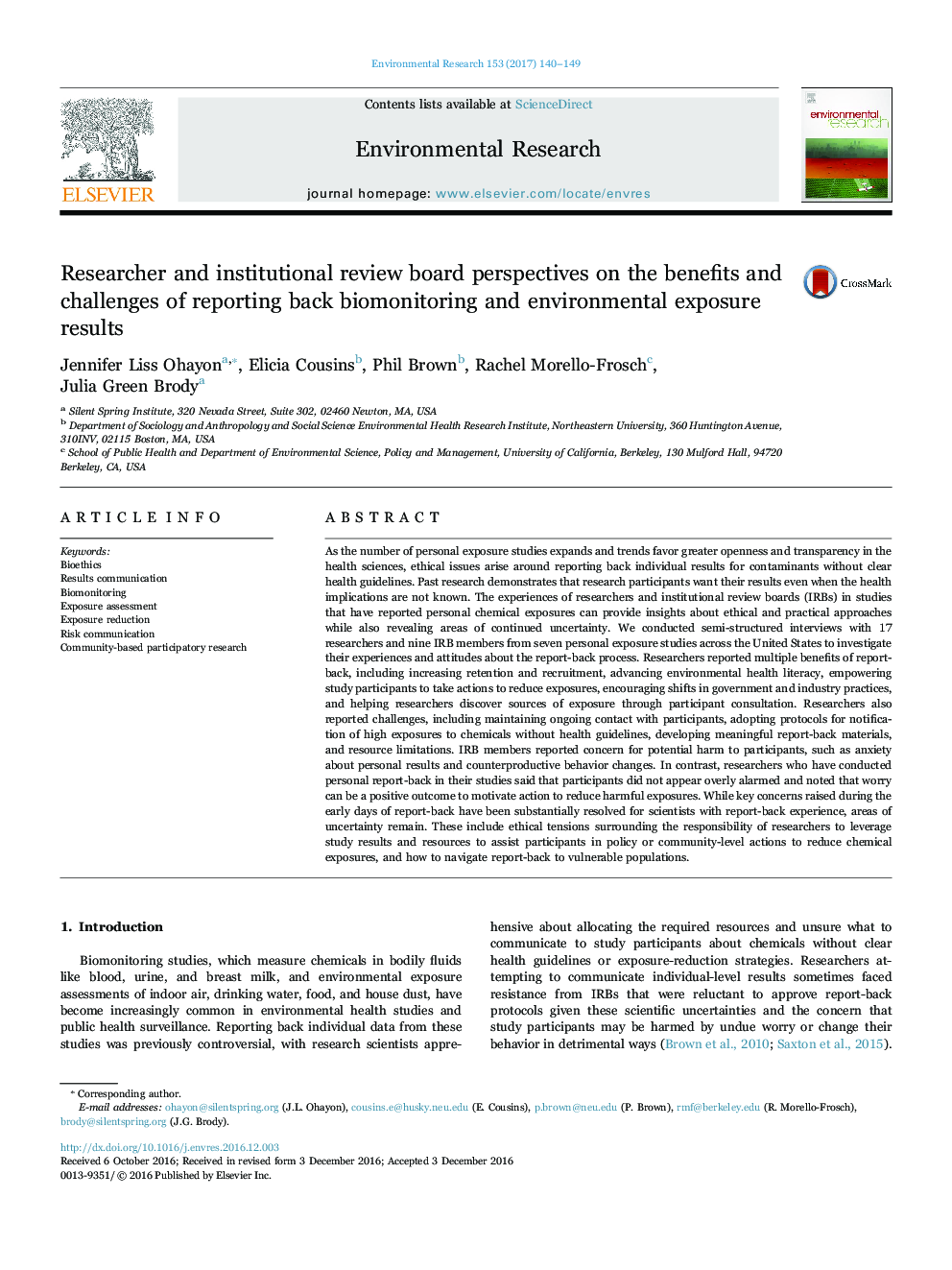| کد مقاله | کد نشریه | سال انتشار | مقاله انگلیسی | نسخه تمام متن |
|---|---|---|---|---|
| 5756259 | 1622550 | 2017 | 10 صفحه PDF | دانلود رایگان |
عنوان انگلیسی مقاله ISI
Researcher and institutional review board perspectives on the benefits and challenges of reporting back biomonitoring and environmental exposure results
ترجمه فارسی عنوان
دیدگاه های هیئت بررسی پژوهشگر و نهاد در مورد مزایا و چالش های گزارش بی نظارت و نتایج تماس با محیط زیست
دانلود مقاله + سفارش ترجمه
دانلود مقاله ISI انگلیسی
رایگان برای ایرانیان
کلمات کلیدی
بیوشیمیایی، ارتباطات نتایج بیومونیتوری، ارزیابی قرار گرفتن در معرض، کاهش قرار گرفتن در معرض، ارتباط ریسک، تحقیق مشارکتی مبتنی بر جامعه،
موضوعات مرتبط
علوم زیستی و بیوفناوری
علوم محیط زیست
بهداشت، سم شناسی و جهش زایی
چکیده انگلیسی
As the number of personal exposure studies expands and trends favor greater openness and transparency in the health sciences, ethical issues arise around reporting back individual results for contaminants without clear health guidelines. Past research demonstrates that research participants want their results even when the health implications are not known. The experiences of researchers and institutional review boards (IRBs) in studies that have reported personal chemical exposures can provide insights about ethical and practical approaches while also revealing areas of continued uncertainty. We conducted semi-structured interviews with 17 researchers and nine IRB members from seven personal exposure studies across the United States to investigate their experiences and attitudes about the report-back process. Researchers reported multiple benefits of report-back, including increasing retention and recruitment, advancing environmental health literacy, empowering study participants to take actions to reduce exposures, encouraging shifts in government and industry practices, and helping researchers discover sources of exposure through participant consultation. Researchers also reported challenges, including maintaining ongoing contact with participants, adopting protocols for notification of high exposures to chemicals without health guidelines, developing meaningful report-back materials, and resource limitations. IRB members reported concern for potential harm to participants, such as anxiety about personal results and counterproductive behavior changes. In contrast, researchers who have conducted personal report-back in their studies said that participants did not appear overly alarmed and noted that worry can be a positive outcome to motivate action to reduce harmful exposures. While key concerns raised during the early days of report-back have been substantially resolved for scientists with report-back experience, areas of uncertainty remain. These include ethical tensions surrounding the responsibility of researchers to leverage study results and resources to assist participants in policy or community-level actions to reduce chemical exposures, and how to navigate report-back to vulnerable populations.
ناشر
Database: Elsevier - ScienceDirect (ساینس دایرکت)
Journal: Environmental Research - Volume 153, February 2017, Pages 140-149
Journal: Environmental Research - Volume 153, February 2017, Pages 140-149
نویسندگان
Jennifer Liss Ohayon, Elicia Cousins, Phil Brown, Rachel Morello-Frosch, Julia Green Brody,
